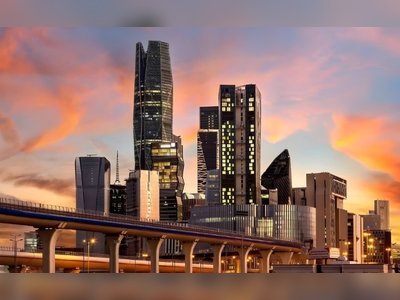
Evergrande can't pay its debts. China is scrambling to contain the fallout
Fitch Ratings on Thursday declared that the embattled property developer has entered "restricted default," reflecting the company's inability to pay overdue interest earlier this week on two dollar bonds. The payments were due a month ago, and grace periods lapsed Monday.
Evergrande's apparent failure to pay that interest has revived fears about the future of the company, which is reeling under more than $300 billion of total liabilities. Evergrande is massive — it has about 200,000 employees, raked in more than $110 billion in sales last year, and owns more than 1,300 developments in more than 280 cities, according to the company.
Analysts have long been concerned that a collapse could trigger wider risks for China's property market, hurting homeowners and the broader financial system. Real estate and related industries account for as much as 30% of GDP.
Chinese authorities have so far downplayed the prospect of spillover risks.
"China's leadership is attempting to play it cool, but the circumstances surrounding Evergrande's downward spiral raises serious questions about [Chinese President] Xi Jinping's stewardship over China's rapidly cooling economy," said Craig Singleton, an adjunct fellow in the China Program at the Foundation for Defense of Democracies, a research institute based in Washington, D.C.
There's already plenty of evidence that Beijing is taking a leading role in guiding Evergrande through a restructuring of its debt and sprawling business operations.
The local government in Guangdong province, where Evergrande is based, said late last week that it would send officials into the firm to oversee risk management, strengthen internal controls and maintain normal operations.
And earlier this week, Evergrande announced it would set up a risk management committee, including government representatives, to focus on "mitigating and eliminating" future risks. Among its members are top officials from major state-owned enterprises in Guangdong, as well as an executive from a major bad debt manager owned by the central government.
Chinese authorities have taken other steps as well. The central bank on Monday announced that it would pump $188 billion into the economy, apparently to counter the real estate slump.
"These latest interventions, by both the central government and officials in Guangdong, suggest Chinese officials now begrudgingly accept that Evergrande is, in fact, 'too big to fail,'" Singleton said.
Global investors may 'take a hair cut'
The massive restructuring is going to come with some pain, at least for global bond holders.
Beijing has made it clear that its priority is protecting the thousands of Chinese people who have bought unfinished apartments, along with construction workers, suppliers and small investors. It also wants to limit the risk of other real estate firms going under. Investor fears over Evergrande's default have pushed up financing costs for other developers, as yields on offshore Chinese corporate debt surge.
At the same time, the government has been trying for more than a year to rein in excessive borrowing by developers — and so won't want to dilute that message.
That means the government may be "happy to see the firm itself go under and investors take a haircut," said Louis Kuijs, head of Asia economics at Oxford Economics, in a research note on Friday.
Chinese regulators have blamed Evergrande's crisis on the company's leaders. Its problems were the result of "poor management and blind expansion," the central bank and the country's securities regulator said Monday in public statements, reiterating previous criticisms.
Yi's comments on Thursday, made during a video speech to a forum in Hong Kong, underscore the government's priorities. He noted that Evergrande's problems would be handled in "a market-oriented way."
That "reinforces the ongoing stance from authorities of not turning to any bailout," said Yeap Jun Rong, market strategist for IG Group.
Spillover to growth
It's a "delicate balancing act" to allow Evergrande to fail while minimizing any economic or financial impact, Kujis said, especially given the broader downturn in real estate that has already seen several other developers default, including Kaisa Group this week.
New home prices in China fell in October for the second consecutive month, according to figures from the National Bureau of Statistics. The fall in September was the first in six years on a month-on-month basis.
A major slowdown in the property sector, along with other factors, could drag China's GDP growth next year down to 4.3%, according to Ting Lu, Nomura's chief China economist. That's much lower than the firm's estimated growth for 2021 of 7.8%.
During an online conference Friday, Lu also warned that the government shouldn't suddenly reverse its curbs on real estate finance. Such a turnaround would hurt Beijing's long-term goals, he added, pointing to its desire to reduce the economy's reliance on property and divert resources away from property into other sectors, such as tech.
Kuijs from Oxford Economics expects Beijing to take targeted policy measures for homeowners, troubled developers, or banks that are exposed to debt risks. He suggested such moves could include making it easier for developers to raise funds on the capital market, adjusting land policies, and increasing the construction of rental units.
"We also expect broader easing of fiscal and monetary policy," he said. "And it is likely the government will take steps to contain ripple effects in the financial system, including possibly ring-fencing banks particularly exposed to developers in trouble."
Singleton warned, though, that the real estate crisis remains a looming threat for China.
"The possibility of contagion in other parts of China's vast economy remains very real," he said. "And, it is on this issue where China's central bank faces its biggest constraint — while it may be able to contain the financial implications from a housing default, it cannot offset the housing market's impact on China's real economy."











